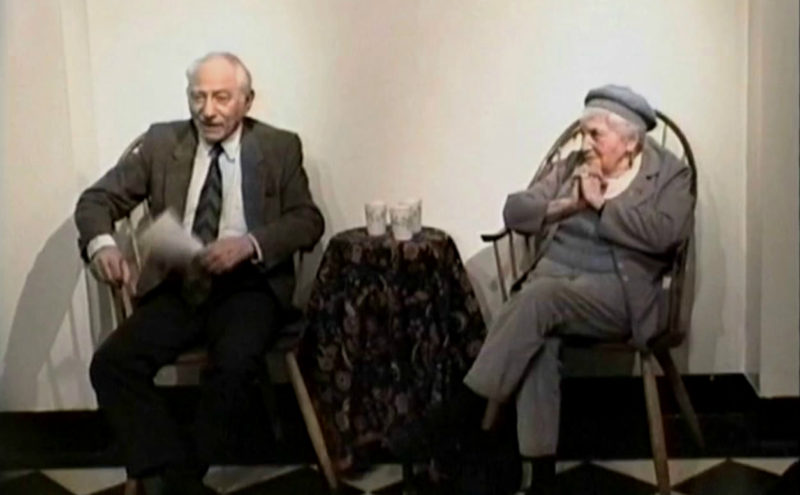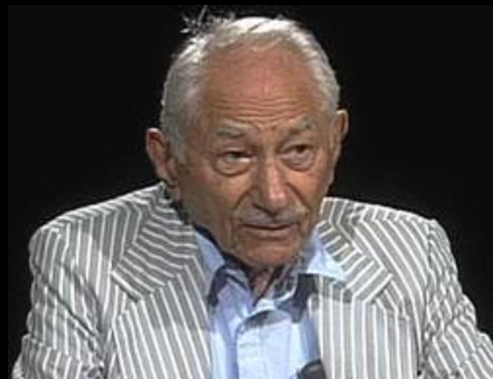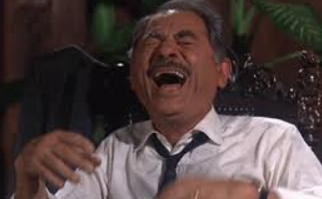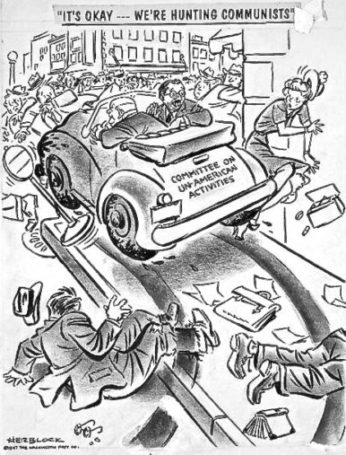
The Legacies Series, an oral history project, features our theatre elders — actors, writers, directors, composers, designers and producers — working people who have kept alive a dedication to the precarious profession that is theatre. This program honors their work by the passing on of their working histories to those of us coming up after them.
1996 : The Cooper Union
Guests
Salem Ludwig served with distinction in the US armed forces during WWII, only to find himself, just a few years later, classified a ‘blacklisted’ artist.




“In 1927, when the Milk Board wanted to sell more milk, they joined marketing forces with the Board of Education, creating a bunch of short plays along the ‘Popeye eats his spinach (milk), becomes strong man’ theme, to be performed by NYC public school students. My teacher chose me, I don’t know why – maybe I was the skinniest and the palest kid in the class.”
So began Salem Ludwig’s 60-year career in the theatre. In December 1940, after a brief, rising career as a dancer and actor, Salem joined the armed services and was assigned to Special Services to conduct ‘morale work’ (entertainment for the soldiers). He was stationed in Australia (where he met Elia Kazan who would become an enormous influence on his work), New Guinea, the Philippines and Japan (post Hiroshima/ Nagasaki bombings). Promoted to Captain, Salem served his country for five years with distinction, only to find himself, just a few years later, classified a ‘blacklisted’ artist. The theatre, then the only medium which did not completely capitulate to ‘the list,’ continued to provide Salem with his livelihood. (In fact he appeared in several productions with Lily Turner’s company, New Stages, after the war). From 1946 Salem became a fixture of the entertainment industry as an actor, director, playscript editor and a teacher. He originated roles and/or performed in the works of Irwin Shaw, Fydor Dostoyevsky, Arthur Miller, Eugene Ionesco, Tennesee Williams and Neil Simon. He shared the stage with such celebrated performers as Jason Robards, Paul Muni and Melvyn Douglas and worked with such distinguished directors as Sidney Lumet, Peter Sellars and Elia Kazan. As a teacher, he was an active member of the Actors Studio and was on the faculty of HB Studio. Salem Ludwig passed away in April 2007.
So began Salem Ludwig’s 60-year career in the theatre. In December 1940, after a brief, rising career as a dancer and actor, Salem joined the armed services and was assigned to Special Services to conduct ‘morale work’ (entertainment for the soldiers). He was stationed in Australia (where he met Elia Kazan who would become an enormous influence on his work), New Guinea, the Philippines and Japan (post Hiroshima/ Nagasaki bombings). Promoted to Captain, Salem served his country for five years with distinction, only to find himself, just a few years later, classified a ‘blacklisted’ artist. The theatre, then the only medium which did not completely capitulate to ‘the list,’ continued to provide Salem with his livelihood. (In fact he appeared in several productions with Lily Turner’s company, New Stages, after the war). From 1946 Salem became a fixture of the entertainment industry as an actor, director, playscript editor and a teacher. He originated roles and/or performed in the works of Irwin Shaw, Fydor Dostoyevsky, Arthur Miller, Eugene Ionesco, Tennesee Williams and Neil Simon. He shared the stage with such celebrated performers as Jason Robards, Paul Muni and Melvyn Douglas and worked with such distinguished directors as Sidney Lumet, Peter Sellars and Elia Kazan. As a teacher, he was an active member of the Actors Studio and was on the faculty of HB Studio. Salem Ludwig passed away in April 2007.
Mr. Ludwig was blacklisted in 1957. Working in television and film came to a halt but he continued to work in theatre.

Lily Turner was the first producer to move a downtown show ‘uptown.

Born on New York’s lower east side in 1906, Lily Turner spent most of her youth in the Bronx. Her mother used to take her to the Hunt’s Point Palace where she heard Caruso sing and Emma Goldman speak. In the early 1920′s she enrolled at NYU to study literature, and there met her first husband, sculptor Raymond Turner, who received a Guggenheim in 1927 which took them both to Paris. There, Lily edited the literary magazine This Quarter where she rejected, among others, a manuscript from Hemingway. The Turners returned to NYC in 1929 and divorced soon after. To survive the Depression, Lily worked as a freelance typist for 10 cents a page, and to supplement this meager income, she took a commission to write pornography at $200 an opus. “I actually made more money writing the ‘How to Get Your Man’ column with Ziegfeld girl, Peggy Hopkins Joyce.” In the ’30′s, Lily lived in Harlem with Tom Daven (founding editor of Natural History Magazine). This was wartime, and Tom and Lily would get all dressed up, board German ocean liners, and plaster the ships’ bathrooms with anti-Nazi leaflets. When the US entered the war, Lily began her life in the theatre. She first became a literary agent, making arrangements for productions of plays by Russian playwrights. She sold one of these plays, Counter Attack, to The Theatre Guild, who produced it and cast one of her closest friends, Morris Carnovsky. Lily placed another drama with the Guild, The Whole World Over, that Harold Clurman directed, toured the US and came to Broadway. After the war, actors, writers and designers returned to the city after years away from the theatre. One hundred and fifty vets banded together to each invest $150 to form New Stages and Lily joined the company. This began her producing career. New Stages’ theater on Bleecker St — later to become The Circle in The Square Theatre — moved its second production, the U.S. premiere of Sartre’s Respectful Prostitute to Broadway in 1948; this was the first show to move “uptown” from “downtown.” For the next forty years, Lily was artistic director of The Greenwich Mews Theatre – a multi-racial company on West 13th St; she ran a summer stock theatre in Woodstock; and in 1955 she renovated an abandoned Ukranian Church at the corner of 2nd Ave. & 10th St. into two theatres called The Gate and The Cricket – which later became the (first) home of George Bartenieff’s Theatre for the New City. And in the late 50’s, Lily renovated an old Con Ed switching station on West 45th St, where her company would be residence for a number of years until it dissolved in the mid-70s; and this space became Primary Stages. Ms Turner passed away in December 1998.
Program for US premiere of Sartre’s The Respectful Prostitute, the first play to ‘move’ from downtown to Broadway … by subway. Produced by Lily Turner













